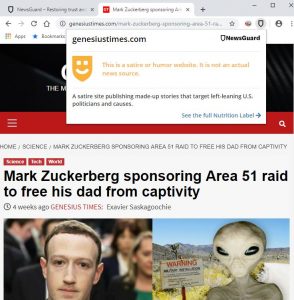Woodford libraries launch program on fake news
By Holly Eaton for Chronicle Media — August 22, 2019

When NewsGuard is installed and active, an icon on the browser menu will turn green, yellow or red, depending on the reliability of the website. By clicking on the icon, viewers can access extensive data about the site that was gathered by trained news analysts. The NewsGuard browser extension is free and may be found at www.newsguardtech.com. (Photo by Holly Eaton/for Chronicle Media)
Fact finding alone can be a challenge on the Internet, especially when lies are dressed up to look like real news.
At the beginning of September, the Illinois Prairie District Public Library will begin using NewsGuard on all of its computer Internet browsers, to help patrons assess the reliability of Internet news.
“We’re the first library district in Illinois to partner with NewsGuard,” said IPDPL Library Director Joel Shoemaker. “Their tool is a free browser extension and it provides what they call a ‘nutrition label’ that grades the news source based on their criteria.”
The Illinois Prairie District Public Library consists of 6 branches located in Benson, Germantown Hills, Roanoke, Spring Bay, Washburn and Metamora, which houses the district headquarters.
NewsGuard has graded more than 2,000 websites, and anyone with the browser extension can submit a website for review, if it has not already been graded. NewsGuard analysts are trained journalists.
One of NewsGuard’s staff analysts is Macaela Bennett, a 2012 graduate of Morton High School. Bennett graduated from Hillsdale College, and was a Pulliam Fellow for the Arizona Republic before reporting on business for Hearst Connecticut Media in Greenwich, Connecticut.
Bennett, who now lives and works in New York City, was in Morton visiting family and contacted Shoemaker about the concept of a NewsGuard partnership and news literacy in general.
“We’re delighted to be partnering with NewsGuard, which does with online content what librarians have been doing with printed content since the invention of libraries,” Shoemaker said. “It gives readers the basic information they need about what they are about to read.”
So how does it work? When NewsGuard’s free browser extension is installed, viewers will first see a small black and white shield on the browser menu. The shield will turn green, yellow or red when a website has been accessed that NewsGuard has reviewed.
If the shield stays black, the website has not been scrutinized, but the site can be sent to NewsGuard for review by clicking on the shield. The stoplight colors signify the reliability of the site.
When accessing news on a search engine, like Google, the same color coded shields will appear next to each link. At reviewed websites, readers can click on the shield for a “nutrition label” that will provide detailed information about that website.
Each label is accredited to its analyst and editor, to ensure that readers are aware of the credibility of the information they’re reading. For example, The Onion, a mostly satirical news site, has a yellow shield for its comedic content.
“Educators and librarians have long championed efforts to educate their communities about how to assess the veracity of information,” said Bennett in a press release. “NewsGuard’s mission includes collaborating with these natural partners to provide their students and patrons with access to tools that help them navigate the evolving information landscape.”
When the extension is installed at all of IPDPL six branches, the NewsGuard extension will be an “information only” version, and the shields will be black and white. The color-rich extension is available for free to anyone, and can be downloaded at www.newsguardtech.com.
Before NewsGuard is downloaded to the library computers, Bennett will host a free workshop called, “Fighting Fake News with Nutrition Labels for Websites: Learn How to be Your Own NewsGuard.”
The workshop will be held Aug. 29 from 5:30 to 6:30 p.m. at the library’s Germantown Hills branch at 509 Woodland Knolls Road. Registration is not required.
“We’re proud to be taking the lead in deploying NewsGuard’s new literacy tool in Illinois,” Shoemaker said.
Ad 1 – 300×250 – Google ROS
Trending News
 With scant notice, Rockford hospital ...Residents on Rockford’s west side are feeling abandoned and betrayed after Javon ...
With scant notice, Rockford hospital ...Residents on Rockford’s west side are feeling abandoned and betrayed after Javon ... State ends fiscal year with ...Despite uncertainty over the economy and federal funding during the second half ...
State ends fiscal year with ...Despite uncertainty over the economy and federal funding during the second half ... Three men shot – one ...Three men were shot – one fatally -- Saturday afternoon on Chicago's ...
Three men shot – one ...Three men were shot – one fatally -- Saturday afternoon on Chicago's ... Highland Park parade ‘full of ...Highland Park’s Fourth of July events included a parade which stepped off ...
Highland Park parade ‘full of ...Highland Park’s Fourth of July events included a parade which stepped off ...
Ad 3 – 300×600 – Post Pages – Google ROS
Ad 2 – 300×250 – Google ROS




